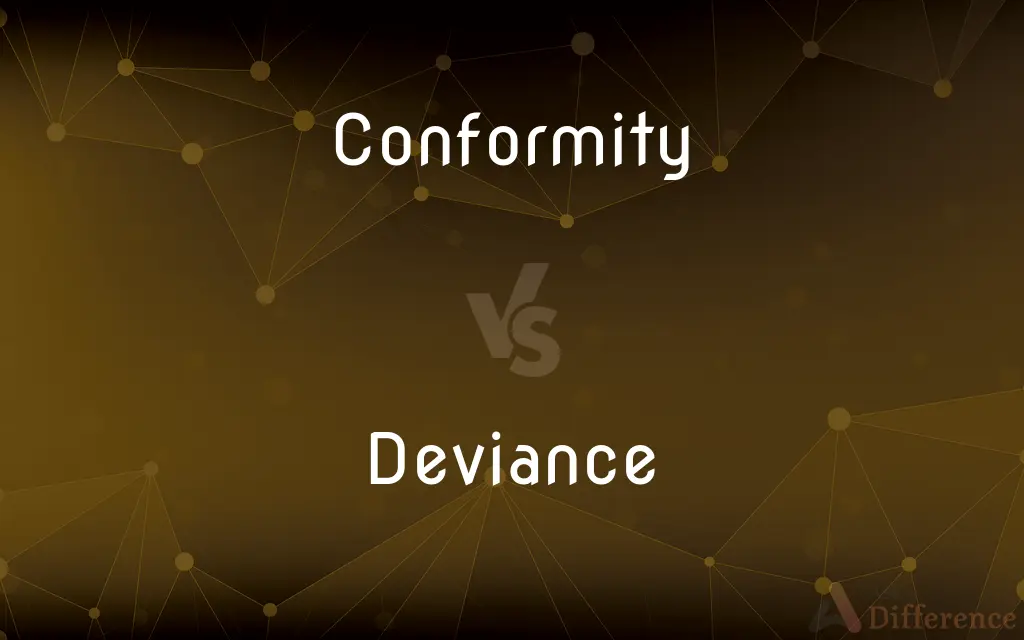Conformity vs. Deviance — What's the Difference?
Edited by Tayyaba Rehman — By Fiza Rafique — Updated on May 6, 2024
Conformity involves adhering to societal norms and expectations, while deviance represents behaviors that defy these standards.

Difference Between Conformity and Deviance
Table of Contents
ADVERTISEMENT
Key Differences
Conformity refers to the act of aligning one's behavior and attitudes with the norms and standards of a group or society. Whereas deviance involves actions or behaviors that violate these accepted norms, often eliciting negative reactions from others.
Conformity is often driven by the desire for acceptance and fear of rejection by peers. On the other hand, deviance can stem from personal belief systems that clash with mainstream values or from a deliberate choice to challenge societal rules.
Conformity typically reinforces social order and predictability within a community. While deviance, by challenging norms, can lead to new ideas and social change, though it may also result in negative sanctions.
Conformity can be seen in everyday practices like following dress codes or workplace etiquette. Whereas deviance might be observed in acts like artistic expression that defies conventional aesthetics or civil disobedience.
Conformity tends to promote uniformity and can sometimes stifle individuality and innovation. On the other hand, deviance often encourages diversity and can be a critical force in societal evolution.
ADVERTISEMENT
Comparison Chart
Definition
Adherence to societal norms and expectations.
Behavior that violates societal norms.
Motivation
Desire for acceptance, fear of rejection.
Personal beliefs, desire to challenge norms.
Social Impact
Reinforces social order, promotes predictability.
Can lead to social change, but may invoke sanctions.
Common Examples
Following dress codes, adhering to professional conduct.
Artistic rebellion, civil disobedience.
Effect on Individuality
Can stifle individual expression.
Promotes diversity and innovation.
Compare with Definitions
Conformity
Observance of societal rules.
Recycling as mandated by community laws is a form of conformity.
Deviance
Breaking of societal norms.
Graffiti often represents deviance from public decorum.
Conformity
Conforming to cultural expectations.
Participating in national holidays exemplifies conformity.
Deviance
Challenging traditional values.
Advocating for unconventional lifestyles challenges societal norms.
Conformity
Adherence to social norms.
Attending office in formal attire is an act of conformity.
Deviance
Acts of civil disobedience.
Participating in sit-ins to protest laws is an act of deviance.
Conformity
Compliance with group behaviors.
Laughing at a joke because everyone else does promotes conformity.
Deviance
Non-conformity in behavior.
Opting for an unconventional career path is a form of deviance.
Conformity
Following standard procedures.
Filing taxes according to regulations demonstrates conformity.
Deviance
Rebellion against accepted norms.
Protesting against government policies can be seen as deviance.
Conformity
Conformity is the act of matching attitudes, beliefs, and behaviors to group norms, politics or being like-minded. Norms are implicit, specific rules, shared by a group of individuals, that guide their interactions with others.
Deviance
Differing from a norm or from the accepted standards of a society.
Conformity
Similarity in form or character; agreement
I acted in conformity with my principles.
Deviance
One that differs from a norm, especially a person whose behavior and attitudes differ from accepted social standards.
Conformity
Action or behavior in correspondence with socially accepted standards, conventions, rules, or laws
Conformity to university regulations.
Deviance
(sociology) Actions or behaviors that violate formal and informal cultural norms such as laws and customs.
Conformity
The relationship between rock or sediment strata that were deposited adjacently or vertically in sequence without any interruption due to erosion, tilting, folding, or similar natural processes.
Deviance
A person or thing that differs from the expected. en
Conformity
A surface exhibiting such a relationship between older rock strata and younger rock strata.
Deviance
An aberrant state or condition.
Conformity
The state of things being similar or identical.
Deviance
Deviate behavior.
Conformity
A point of resemblance; a similarity.
Deviance
A state or condition markedly different from the norm
Conformity
The state of being conforming, of complying with a set of rules, with a norm or standard.
Deviance
Deviate behavior
Conformity
The ideology of adhering to one standard or social uniformity.
Conformity
Correspondence in form, manner, or character; resemblance; agreement; congruity; - followed by to, with, or between.
By our conformity to God.
The end of all religion is but to draw us to a conformity with God.
A conformity between the mental taste and the sensitive taste.
Conformity
Compliance with the usages of the Established Church.
The king [James I.] soon afterward put forth a proclamation requiring all ecclesiastical and civil officers to do their duty by enforcing conformity.
Conformity
Correspondence in form or appearance
Conformity
Acting according to certain accepted standards
Conformity
Orthodoxy in thoughts and belief
Conformity
Concurrence of opinion;
We are in accord with your proposal
Conformity
Hardened conventionality
Common Curiosities
How is conformity enforced in societies?
Through socialization, laws, and sometimes peer pressure or legal sanctions.
How do psychologists measure conformity?
Through experiments and observations, such as Asch's conformity experiments.
What causes individuals to conform?
People often conform to seek approval from others, avoid conflict, or gain social acceptance.
Are all acts of deviance illegal?
No, not all deviant acts are illegal; some may simply violate social conventions without breaking laws.
What are the consequences of deviance?
Consequences can include social ostracism, legal penalties, or, conversely, social recognition.
How does deviance affect society?
Deviance can disrupt social order but also encourages social change by challenging outdated norms.
What role does culture play in defining conformity?
Cultural values and norms significantly shape what is considered conformity in a given society.
Can deviance be positive?
Yes, positive deviance involves breaking norms to create constructive change, such as in social reform movements.
What is conformity?
Conformity is the act of matching attitudes, beliefs, and behaviors to group norms or societal standards.
Why do some people choose to be deviant?
Reasons can range from personal beliefs to a desire for societal change or personal attention.
Can conformity be harmful?
Excessive conformity can suppress individuality and discourage critical thinking.
Share Your Discovery

Previous Comparison
Joke vs. Gig
Next Comparison
Conversation vs. ArgumentAuthor Spotlight
Written by
Fiza RafiqueFiza Rafique is a skilled content writer at AskDifference.com, where she meticulously refines and enhances written pieces. Drawing from her vast editorial expertise, Fiza ensures clarity, accuracy, and precision in every article. Passionate about language, she continually seeks to elevate the quality of content for readers worldwide.
Edited by
Tayyaba RehmanTayyaba Rehman is a distinguished writer, currently serving as a primary contributor to askdifference.com. As a researcher in semantics and etymology, Tayyaba's passion for the complexity of languages and their distinctions has found a perfect home on the platform. Tayyaba delves into the intricacies of language, distinguishing between commonly confused words and phrases, thereby providing clarity for readers worldwide.
















































